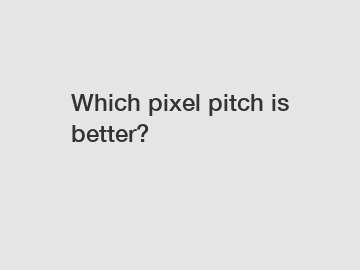Which pixel pitch is better?
When it comes to choosing an LED display, one of the most important factors to consider is the pixel pitch. Pixel pitch refers to the distance between the individual pixels on an LED screen, and it plays a crucial role in determining the image quality and clarity of the display. However, with the wide range of pixel pitch options available in the market, it can be challenging to determine which one is better suited for your needs. In this article, we will discuss the different pixel pitch options and help you understand which one might be the best choice for you.
What is Pixel Pitch?
Pixel pitch refers to the distance between the center of one pixel to the center of the adjacent pixel on an LED display. It is measured in millimeters, and a smaller pixel pitch indicates a higher pixel density, resulting in sharper and clearer images. On the other hand, a larger pixel pitch means lower pixel density and may result in less detailed images.

Understanding Different Pixel Pitch Options.
There are various pixel pitch options available in the market, ranging from as low as 1mm to as high as 20mm or more. Each pixel pitch has its advantages and disadvantages, depending on the specific application and viewing distance.
Small Pixel Pitch (1mm to 3mm).
LED displays with a pixel pitch of 1mm to 3mm are considered to have high resolution and are ideal for applications where viewers are expected to be close to the screen, such as indoor advertising displays, conference rooms, and control rooms. These displays provide sharp and detailed images, making them suitable for high-definition content and interactive applications.
Medium Pixel Pitch (4mm to 8mm).
LED displays with a pixel pitch of 4mm to 8mm are commonly used for indoor and outdoor applications where viewers are expected to be at a moderate distance from the screen. These displays strike a balance between resolution and affordability, making them suitable for retail stores, transportation hubs, and sports stadiums.
Large Pixel Pitch (10mm and above).
LED displays with a pixel pitch of 10mm and above are typically used for outdoor applications where viewers are expected to be at a considerable distance from the screen. These displays offer excellent visibility even in bright sunlight and are commonly used for billboards, digital signage, and building wraps.
Which Pixel Pitch is Better?
The choice of pixel pitch depends on various factors, including the viewing distance, content type, budget, and installation location. For applications where viewers are expected to be close to the screen, a smaller pixel pitch (1mm to 3mm) is recommended to ensure sharp and detailed images. On the other hand, for applications where viewers are at a moderate or considerable distance from the screen, a medium (4mm to 8mm) or large (10mm and above) pixel pitch may be more appropriate.
Ultimately, the best pixel pitch for your LED display will depend on your specific requirements and objectives. It is important to consult with a professional LED display provider to determine the most suitable pixel pitch for your application.
Contact Us.
If you need further assistance in choosing the right pixel pitch for your LED display, feel free to contact us. Our team of experts is here to help you make an informed decision and find the best solution for your needs.
For more information, please visit vms board, vms sign board, Clear Lens Traffic Light.


